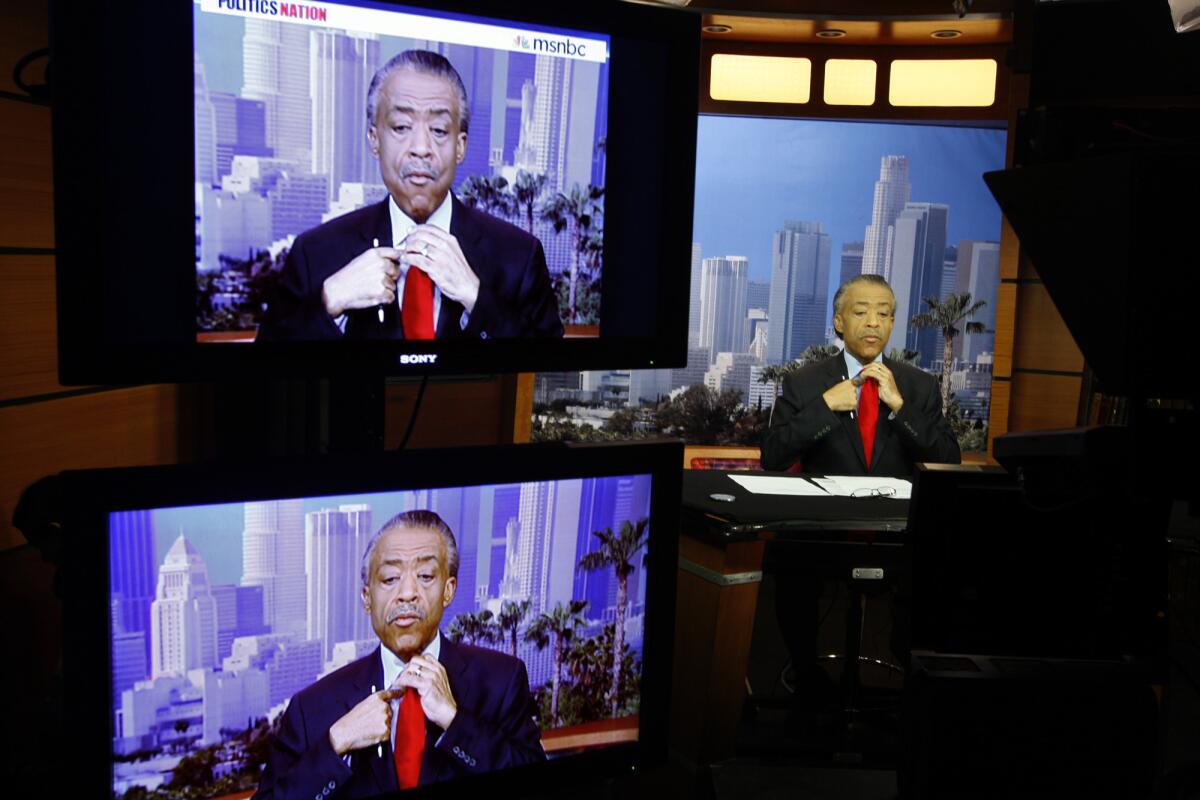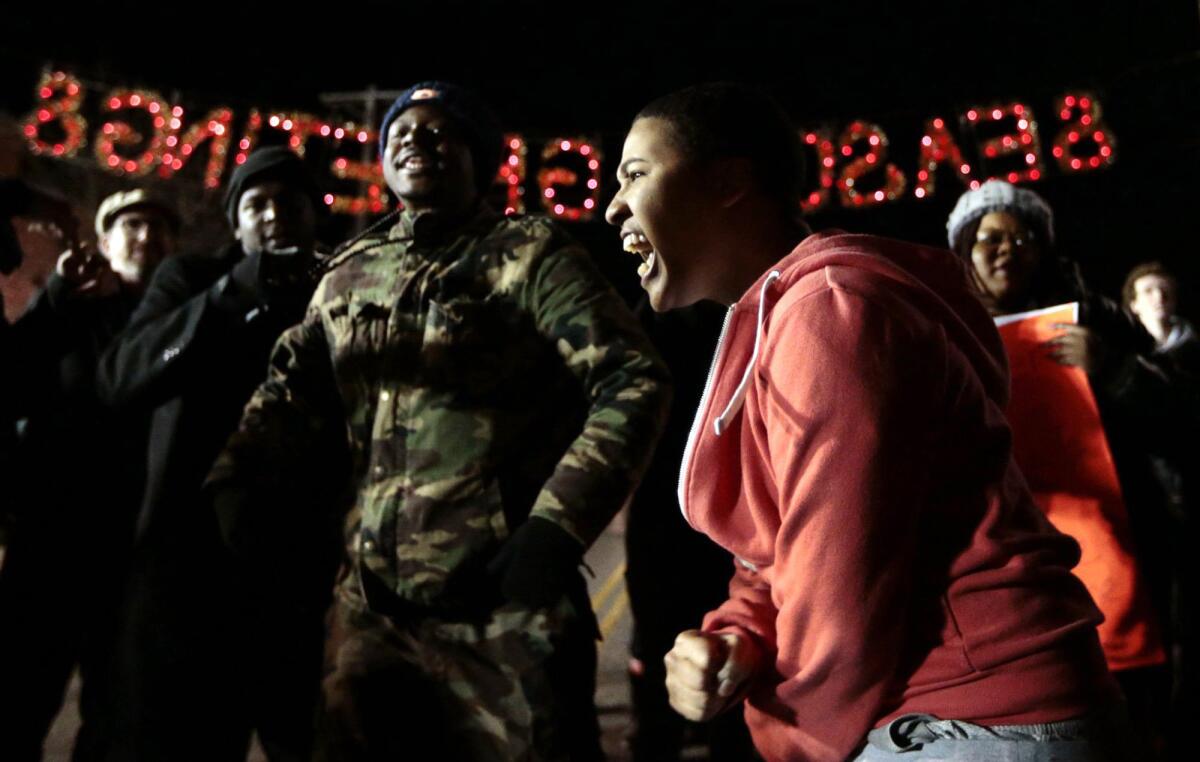Review: ‘Democracy in Black’ is a bracing call to action for African Americans

Rev. Al Sharpton, shown at a television taping, is part of the “black political class” Eric S. Glaude Jr. criticizes in his book, “Democracy in Black.”
- Share via
“We laud our democratic virtues to others and represent ourselves to the world as a place of freedom and equality,” Eddie Glaude writes of the U.S. in his unflinching new book, “Democracy in Black,” “all while our way of life makes possible choices that reproduce so much evil, and we don’t see it happening — or worse, we don’t want to know about it.”
Glaude’s “Democracy in Black: How Race Still Enslaves the American Soul” is as narratively unrelenting as it is thematically percussive, calling for black Americans to take dramatic action in our lives, voting booths and on the streets to contend with a “value gap” that has left African Americans behind socially and economically.
On Jan. 13, Barack Obama, the first black president of the United States, delivered a boastful State of the Union rooted in American exceptionalism, the importance of political cooperation and predictably, what we have, will, and can do to our enemies with our big American guns. Eight days earlier, Obama had held a press conference during which he cried over the murders of 30 American children and countless others victims of citizens wielding small American guns.

Grassroots leader Alexis Templeton, in Ferguson, MO., is part of a new generation of activists heralded by Eric S. Glaude in his book, “Democracy in Black.”
I watched both political spectacles, knowing that while the violent, often racist American weight on President’s Obama’s back has been so terrifyingly heavy, the violent, exceptional American weight that he and all American presidents must abusively wield is heavier. “Democracy in Black,” one of the most imaginative, daring books of the 21st century, effectively argues that this weight — rooted in American exceptionalism — impedes a national reckoning of how the racial “value gap” in our nation sanctions black Americans terror while providing systemic unearned value to white Americans.
The book asks us to reconsider not simply what presidential tears for systemic violence initiated and condoned by our nation might look like, but what can a revolution fueled by politically active black Americans wholly disinterested in presidential tears, speeches or “post-racial” policy actually accomplish. In this way, the book is not just post-Obama; it is post-presidential.
Early in the book, Glaude anticipates the question of why might we need a revolution of the imagination now, in the last year of our first black president’s term. It makes sense that a book demanding more courage, more imagination and more impactful organizing starts with young people in Ferguson, Mo., who are already doing the work. The book begins with Glaude sitting down with Alexis Templeton, Brittany Ferrell and Ashley Yates, three dynamic grass-roots activists and cofounders of Millennial Activists United. Glaude astutely calls these young black women and their generation of young black activists “unprecedented.” He pivots from their model of impactful imaginative courageous to a terrifying account of where we are in 2016.
We are, Glaude argues, in the midst of “The Great Black Depression” — not simply a financial crisis. For the first time in recorded American history there are more poor black children than there are poor white children even though there are three times more white children than black children in the nation. Thirty-eight percent of black children live in poverty, yet these black children, and the conditions in which these black children live, were not valued enough to be talked about in either Obama’s State of the Union speech or the Republican debate the next day.
While Obama is a consistent culprit in “Democracy in Black,” Glaude eviscerates the abusive power of Bill O’Reilly, Republicans, Ben Stein and “white folks” generally while asking and really answering the most revealing of all 21st century American questions: “Are we a nation of monsters?”
In his most tightly argued chapter, Glaude holds Obama (a “post-black liberal”), Al Sharpton and Jesse Jackson (“traditional black liberals”) partly responsible for black Americans’ political and economic disappearance. The black political classes have been “accomplices in the demise of black America,” he argues. “Our entrée into American society is not only contingent on the eradication of racism, but also on the disappearance of black people altogether,” Glaude writes. “Black people must lose their blackness if America is to be transformed. But — of course — white people get to stay white.”
The book’s most controversial idea is Glaude’s call for a “blank-out campaign,” where he argues that black voters should participate in showing up to polls on Nov. 2 in the same record numbers we showed up in the Obama elections and cast votes for local races but refuse to cast a vote for president.
Join the conversation on Facebook >>
Far from politically or intellectually naive, Glaude anticipates criticism from the black political class that such a blank-out campaign “amounts to no more than electoral nihilism.” Glaude maintains that this critique is a scare tactic designed to cloud our imagination. “An electoral blank-out undermines, at least for an election cycle, the assumption that black voters are captured and silent” while disrupting business as usual for a Democratic party content with being the lesser of two evils and “the racial advocacy hustle of a black political class leveraging its ability to deliver black voters for crumbs and/or selfish gain.”
Glaude convincingly asserts that a blank-out, particularly within a system where both parties have devalued the lives of black voters, might reboot politics, embolden already existing grass roots organizing, and create more webs of resistance and possibility.
But because every chapter in “Democracy in Black” is a revelation, and every paragraph a ripe possibility, I wish Glaude, a professor at Princeton, would have used part of his book to contend with what it means for one with more access to more second chances than most black Americans to ask other black Americans to forego voting for “a lesser of two evils” presidential candidate who might use their executive power to extend unemployment benefits, appoint the federal judges who might restore voting rights, or strengthen existing laws that make it harder for employers to discriminate against folks because of their race, gender and sexual orientation. While “Democracy in Black” is in many ways wholly persuasive as an effortless balance of memoir, journalism and analysis, it’s also conveniently clean in places where political, communal and personal messiness might advance and complicate Glaude’s calls to action.
I left “Democracy in Black” wondering what might it mean for a “revolution of value” if black professors — including myself — committed to valuing the black communities that made us, gave up jobs at white, so-called elite, neo-liberal private institutions (many of which are responsible for educating the “monsters” who eventually become president, vice president, speaker of the House), and actually committed to educating, living and learning at black colleges, universities, junior colleges and high schools if they would have us? Why is that a choice Glaude and so many of us committed to a “revolution of value” have yet to make?
I am not at all arguing that Glaude should give up anything. But a text that tells us, “There are those among us willing to turn their backs on democracy to safeguard their privilege” and “No one can be comfortable” must, at some point, courageously reckon with the author’s relationships to privilege, poverty, familial responsibility, and comfort. The risks of a chapter like this are great. But risk, Glaude argues, we must. In such a chapter, Glaude might have forced the reader to really grapple with the imaginative, economic and psychological consequences of black American intergenerational poverty while giving real legs, heart and hope to this revolution of value.
Yet even without such considerations, Glaude has given us a book for the ages and a reminder, as he writes, that black Americans have changed the course of this nation before, and we must, with courage, imagination and new strategies, change this nation again.
Laymon is professor of English at Vassar College and the author of “Stank: An American Memoir” coming from Scribner in winter 2016.
::
‘Democracy in Black: How Race Still Enslaves the American Soul’
Eddie S. Glaude Jr.
Crown: 288 pages, $26
More to Read
Sign up for our Book Club newsletter
Get the latest news, events and more from the Los Angeles Times Book Club, and help us get L.A. reading and talking.
You may occasionally receive promotional content from the Los Angeles Times.









